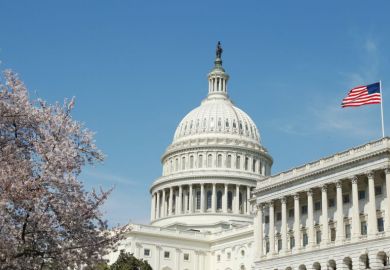The chaos surrounding the US government’s spending bill raises questions about how effectively research agencies and universities can spend their allocations, experts have warned.
Last month, US president Donald Trump signed into law a $1.3 trillion (£920 billion) spending bill, which outlines the budget for all federal departments and agencies for the remainder of the 2018 fiscal year, but the budgeting process was far from smooth.
In January, the government officially shut down for the first time in five years after the Senate rejected a short-term spending bill to keep the federal government running in light of the delay.
The final budget is also markedly different from the priorities outlined in Mr Trump’s request. The president had sought to cut funding for the Department of Education by $3.6 billion, but in the approved version its income has increased by $3.9 billion.
The National Endowment for the Arts and the National Endowment for the Humanities each received a $3 million increase, despite the fact that the president’s budget had called for both to be eliminated.
And the National Science Foundation was allocated $7.8 billion, $1.1 billion more than Mr Trump had requested. Student aid programmes also received a boost in funding.
Last year, Congress also rejected the president’s proposed research funding cuts.
Although the funding increases will be welcome news for the higher education sector, policy experts have warned that the delay and unpredictability of the budget has created some complications for universities and research agencies.
Terry Hartle, senior vice-president in the division of government and public affairs at the American Council on Education, said that the budget process for the current fiscal year “has been a complete shambles”.
The hold-up in research funding “has delayed federal agencies’” ability to solicit grant applications and make awards, “so I think you will see both scientists and federal officials scrambling to spend that money before 30 September, when the current fiscal year ends”, he said.
“Budget turmoil dramatically complicates government planning. Agencies don’t know how much money they have to work with, so they don’t know what initiatives they should expand or contract or initiate.”
The budget for the next fiscal year is also likely to be delayed as politicians turn their attention to the midterm elections in November, Dr Hartle added.
Nevertheless, he said, this year’s increases in research and education funding “suggest the delay was worth it”.
Kenneth Wong, Walter and Leonore Annenberg chair for education policy at Brown University, agreed that the budget chaos “creates uncertainty and raises ambiguity in terms of the effectiveness of the use of these funds”.
He said that the funding delay “interrupted…some of the announcements of calls for [research] proposals” and in some cases prevented agencies releasing approved grants.
“Any delay in those announcements for funding opportunities would affect how [scholars] organise their laboratory work and then how they think about collaboration,” he said. “It does raise a lot of operational uncertainty every time the funding agencies delay their announcement for funding opportunities.”
But a spokeswoman for the National Science Foundation said that additional funding was provisionally allocated to the agency in the addendum to the president’s budget request for the 2019 fiscal year, which has allowed it to plan.
The National Endowment for the Humanities said that it has been “actively reviewing applications, awarding grants, and distributing funds” despite the delay.
Register to continue
Why register?
- Registration is free and only takes a moment
- Once registered, you can read 3 articles a month
- Sign up for our newsletter
Subscribe
Or subscribe for unlimited access to:
- Unlimited access to news, views, insights & reviews
- Digital editions
- Digital access to THE’s university and college rankings analysis
Already registered or a current subscriber?








